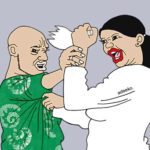It is not true that people with darker skin tones are immune to skin cancer. Black people and those with darker skin tones can and do get skin cancer. However, skin cancer is not a frequent occurrence among black people.
According to the American Academy of Dermatology, people with darker skin tones often do not receive a diagnosis until the cancer is in its later stages. This tends to be because the symptoms are harder to recognize.
Late stage diagnosis can be life threatening. According to the Skin Cancer Foundation, the 5-year melanoma survival rate for black people in the United States is 65%, compared with 91% for white people.
Keep reading to learn more about skin cancer in black people and what people can do to help prevent it.
How common is it?
Skin cancer is not common among people with darker skin.
In fact, according to the Skin Cancer Foundation, among black people in the U.S., skin cancer makes up only 1–2% of all cases of cancer. In people with darker skin, such as Hispanic and Asian people, skin cancer makes up 4–5% and 2–4%, respectively, of all cases of cancer.
When skin cancer does occur, the most common places a tumor may develop include areas of lighter skin, such as: mucous membranes, such as inside the mouth, under the nails, the soles of the feet, the palms of the hands, the anogenital region, which is the area around the groin and anus; the lower legs.
In non-white people, the most common place for a tumor to develop is on the plantar, or the tissue that runs along the bottom of the foot. This accounts for 30–40% of all skin cancer cases.
Types
Three types of skin cancer are of particular concern to people with darker skin: squamous cell carcinoma, which is most common in black people
melanoma
basal cell carcinoma
When a healthcare provider diagnoses it early, treatment can usually send all three types into remission. However, black people and those with darker skin tones are less likely to receive a cancer diagnosis early.
According to the American Academy of Dermatology, for African American people: doctors diagnose around 24% of melanoma cases in the regional stage, meaning that the cancer has spread to nearby lymph nodes; doctors diagnose around 16% when they are in the distant stage, meaning that the cancer has spread to distant parts of the body.
Prevention and early detection
People of any skin color can take the same steps to help prevent skin cancer.
Some basic steps include: seek shade whenever possible, wear clothing that covers most of the skin, especially during prolonged periods outside; wear sunscreen on exposed areas, avoid tanning beds; apply sunscreen 15–30 minutes before going out and reapply every 2 hours.
As well as taking steps to limit direct sun exposure, people of any skin color should perform self-examinations every month. In a self-examination, a person should check their body for potential tumors. To do so, they can: use a mirror to examine difficult-to-see areas, especially on the bottoms of the feet and between the toes, if they have dark skin, check the areas most likely to develop skin cancer, such as the soles of the feet, inside the mouth, the anogenital region, the palms of the hands, and other areas where the skin’s pigment is not as dark.
When checking the skin, black people should look for some of the following symptoms: a sore that will not heal or that heals and then reappears; a dark spot, growth, or darker area of skin that is bleeding; growing, or changing in size or shape; a dark line around or underneath a fingernail or toenail; a sore that does not heal well or quickly.
Diagnosis
Diagnosis can start at home.
People should check their skin every month for symptoms of skin cancer. If they notice that any are present, they should speak to their healthcare provider as soon as possible.
The doctor will examine the person’s skin. If symptoms are already present in one area of skin, they will typically focus their attention on that area. They will likely ask general questions about a person’s family and personal history of skin cancer.
If there is any suspicion of skin cancer, a doctor will perform an excisional biopsy. They may cut all or a portion of the area out of the skin. They will then send the tissue to a pathology laboratory, where experts will examine it under a microscope to determine whether or not it is cancerous.
After diagnosis, a doctor will recommend potential treatment options. The best treatment option for each person will depend on the type of cancer, as well as if or how far it has spread.
There are many treatment options available, including the surgical removal of the surrounding area to ensure that no cancer cells remain. Specifically, doctors may suggest Mohs surgery, wherein a surgeon will progressively remove thin layers of affected skin until healthy tissue remains. Doctors may also recommend chemotherapy or radiation therapy.
Takeaway
Although it is not common, it is possible for black people and people with darker skin to develop skin cancer. Every person should check their skin regularly for abnormal growths or other changes.
When a person receives an early diagnosis, treatments are typically effective. However, among black people, doctors usually diagnose skin cancers in the later stages. This is often because the symptoms are more difficult to recognize. By this time, however, the cancer is harder to treat.
It is important that black people check common areas on their skin where skin cancer can occur, including the soles of their feet, the palms of their hands, the anogenital region, lower legs, and inside the mouth.
Source:Medicalhealthnewstoday.com
WATCH TOP VIDEOS FROM NIGERIAN TRIBUNE TV
- Let’s Talk About SELF-AWARENESS
- Is Your Confidence Mistaken for Pride? Let’s talk about it
- Is Etiquette About Perfection…Or Just Not Being Rude?
- Top Psychologist Reveal 3 Signs You’re Struggling With Imposter Syndrome
- Do You Pick Up Work-Related Calls at Midnight or Never? Let’s Talk About Boundaries





